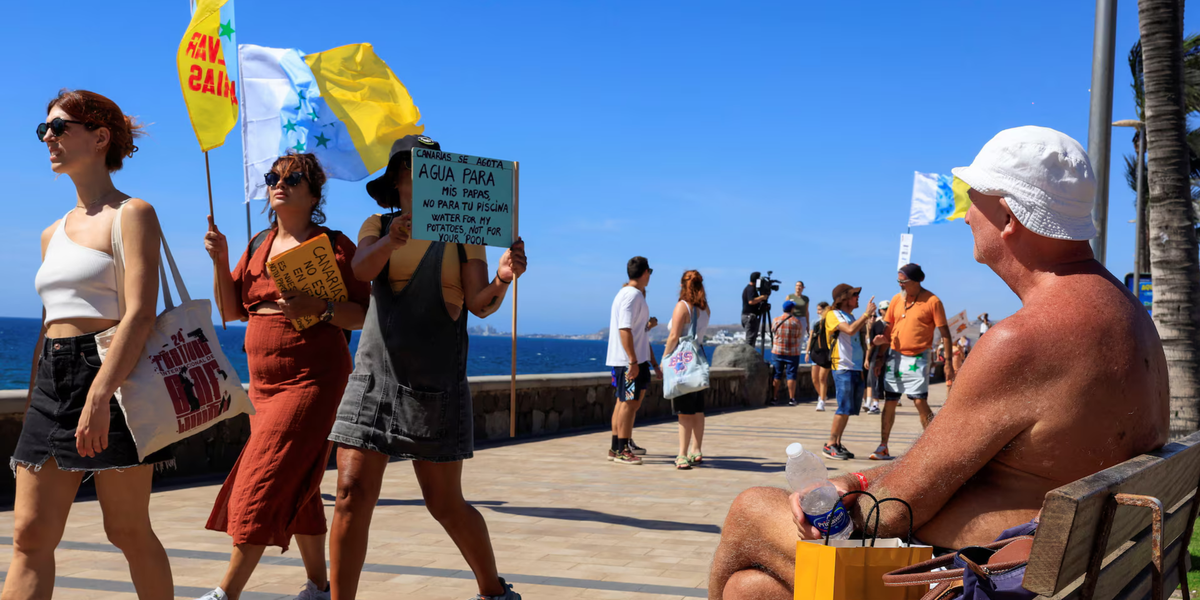Canary Islands: A Clash of Cultures Amidst Rising Anti-Tourism Sentiment
The picturesque Canary Islands, known for their stunning landscapes and vibrant culture, are currently embroiled in a heated debate over tourism. While the islands have long welcomed millions of visitors, recent months have seen a surge in anti-tourism protests, particularly targeting British holidaymakers. However, as the protests escalate, a counter-movement is emerging, highlighting the complex relationship between locals and the tourism industry.
The Rise of Anti-Tourism Protests
Over the past year, anti-tourism sentiment in the Canary Islands has reached a boiling point. Organized by various groups under the slogan "Canary Islands have a limit," these protests have drawn attention to the perceived negative impacts of mass tourism on local communities. Demonstrators have taken to popular beaches and streets, brandishing placards with messages such as "the Canaries don’t live off tourism, tourism lives off the Canaries." Some protesters have even resorted to provocative imagery, including representations of guns, to emphasize their discontent.
The protests have not gone unnoticed by bemused holidaymakers, who have found themselves at the center of the demonstrations. Many tourists report feeling unwelcome, with some locals openly telling them to "go home." The protests have garnered significant media coverage, highlighting the growing divide between those who rely on tourism for their livelihoods and those who feel overwhelmed by its consequences.
Local Backlash Against Anti-Tourism Sentiment
In response to the anti-tourism protests, a faction of locals has begun to push back. Business owners, recognizing the vital role tourism plays in the islands’ economy, have organized counter-protests to advocate for the industry. One notable initiative, "Lanzarote Loves Tourism," was spearheaded by Augusto Ferreira, a local restaurant owner. Ferreira condemned the anti-tourism movement, attributing its rise to local politicians engaging in "political games."
Ferreira’s sentiments are echoed by many in the community who understand the economic significance of tourism. He stated, "I have heard very nice stories from people who say their family live off tourism, and that thanks to tourism they are what they are." This perspective underscores the reality that many locals depend on the influx of tourists for their livelihoods.
Economic Impact of Tourism
The economic implications of tourism in the Canary Islands are staggering. According to the Spanish National Statistics Institute, the islands welcomed 9.9 million tourists from January to September 2024, marking a 10.3 percent increase from the previous year. This influx of visitors generated a record-breaking 20 billion euros for the local economy in 2023. Despite the protests, these figures illustrate the critical role that tourism plays in sustaining the islands’ economic health.
However, the protests have not been without their supporters. Some locals, like Sarah Lopez from Gran Canaria, argue for a reevaluation of the tourism model. Lopez stated, "We need a change in the tourist model so it leaves richness here, a change so it values what this land has because it is beautiful." This sentiment reflects a desire for a more sustainable approach to tourism that prioritizes local needs and environmental concerns.
Legislative Responses to Tourism Concerns
In light of the growing anti-tourism sentiment, the Canary Islands’ regional government has proposed new legislation aimed at regulating short-term rentals. This law, expected to pass, would prohibit new build properties from offering short-term lets, giving existing property owners a five-year window to comply. The goal is to address rising housing costs and ensure that locals have access to affordable living options.
While some view these measures as necessary for protecting local communities, others warn of the potential economic fallout. Martin Astley, a long-term resident and Tenerife estate agent, posed a provocative question: "What would the protesters think if tourists and tour operators boycotted the Canary Islands for a whole year or two?" This highlights the delicate balance that must be struck between addressing local concerns and maintaining a thriving tourism industry.
Conclusion: Finding Common Ground
The situation in the Canary Islands serves as a microcosm of the broader global debate surrounding tourism and its impacts on local communities. As anti-tourism protests continue to unfold, it is clear that the islands are at a crossroads. While the desire for change is palpable, so too is the recognition of tourism’s vital role in the local economy.
As both sides of the debate seek to make their voices heard, finding common ground will be essential. The challenge lies in creating a sustainable tourism model that respects the needs of local residents while still welcoming visitors to experience the beauty and culture of the Canary Islands. Only through dialogue and collaboration can the islands hope to navigate this complex issue and ensure a prosperous future for both locals and tourists alike.
